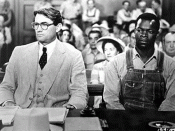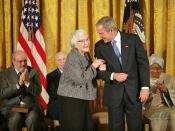The mockingbird - The title of To Kill a Mockingbird has very little literal connection to the plot, but it carries a great deal of symbolic weight in the book. In this story of innocents destroyed by evil, the "mockingbird" comes to represent the idea of innocence. Thus, to kill a mockingbird is to destroy innocence. Throughout the book, a number of characters (Jem, Tom Robinson, Dill, Boo Radley, and Mr. Raymond) can be identified as mockingbirds. Innocent people who have been injured or destroyed through contact with evil.
This connection between the novel's title and its main theme is made clear several times in the novel. After Tom Robinson is shot, Mr. Underwood compares his death to "the senseless slaughter of songbirds," and at the end of the book Scout thinks that hurting Boo Radley would be like "shootin' a mockingbird." Most important, Miss Maudie explains to Jem: "Mockingbirds don't do one thing but ...
sing their hearts out for us. That's why it's a sin to kill a mockingbird." That Jem and Scout's last name is Finch (another type of small bird) indicates that they are particularly vulnerable in the racist world of Maycomb, which often treats the fragile innocence of childhood harshly.
The most important theme of To Kill a Mockingbird is the book's exploration of the moral nature of human beings-that is, whether people are essentially good or essentially evil. The novel approaches this question by dramatizing Scout and Jem's transition from a perspective of childhood innocence. In which they assume that people are good because they have never seen evil, to a more adult perspective, in which they have confronted evil and must incorporate it into their understanding of the world.
As a result of this portrayal of the transition from innocence to experience, one...



Fairly well done
I thought your notes covered most of the essential points of the TKMB. Few grammar errors here and there, but it's not big, so I won't worry about them too much :). I liked the opening paragraph, how you talked about titles and such. Good job!!!!
5 out of 6 people found this comment useful.